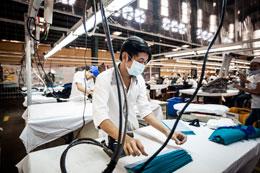Virus surge in Southeast Asia impacts manufacturing sector

Across south-east Asia, countries that managed to avoid the worst of the pandemic last year are facing new waves of Covid-19, fuelled by more contagious variants.
In several countries in the region, including Malaysia, Vietnam and Cambodia, clusters have begun in key manufacturing sites. In Vietnam, which virtually eradicated the virus last year, total cases have tripled since the start of May, reaching almost 10,000, driven partly by outbreaks in factories.
Malaysia was forced to impose a lockdown this month after daily cases surpassed 9,000. Much of the country’s manufacturing sector has been allowed to continue operating at limited capacity throughout lockdown, despite concerns raised by campaigners. Last Friday, it emerged that more than 800 workers at glove maker WRP had tested positive for Covid.
“Unfortunately the whole setup of these production lines and factories is not conducive to Covid-19 prevention,” said Andy Hall, a specialist in migrant workers’ rights.
Increased demand for certain goods during the pandemic has placed additional pressure on supply chains. Many such products are destined for Europe: tech gear and printers for people who are working from home, medical gloves for health workers, tinned tuna for people stocking up the cupboards.
In Thailand, workers at more than 130 factories have been infected, according to a survey by the industry ministry reported by Thai media. This includes Charoen Pokphand Foods, Thailand’s biggest agriculture business.
Suthasinee Kaewleklai, Thailand coordinator of the advocacy group the Migrant Workers Rights Network, said many of the country’s affected factories are staffed by workers from Cambodia and Myanmar, who are especially vulnerable. “They don’t have worker unions or labour unions like Thai workers. They don’t have representatives to negotiate what the employers should do for them.”
As cases have risen across many countries in the region, access to vaccines is limited.
Campaigners are calling for governments to ensure that migrant workers get equal access to vaccines, including undocumented migrants who are not currently in work. Many worry about penalties if they come forward and do not have the right papers.









